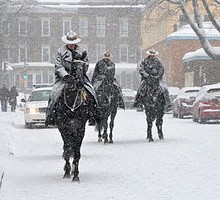History of the Royal Canadian Mounted Police

When Calls the Heart has given us an appreciation for the Royal Canadian Mounted Police. Here is some information about the history of the men in red we admire.
Royal Canadian Mounted Police:
Born out of a need for a national police force to implement the law in Canada’s newly acquired western territories, the Royal Canadian Mounted Police has evolved into a world-renowned organization of more than 28,000 people.
The following is an excerpt from Wikipedia. For full article, see: https://en.wikipedia.org/wiki/Royal_Canadian_Mounted_Police
Overview
The Royal Canadian Mounted Police (RCMP) was formed in 1920 by the merger of the Royal Northwest Mounted Police (RNWMP, founded in 1873) with the Dominion Police (founded 1868). The former was originally named the North-West Mounted Police (NWMP), and was given the Royal prefix by King Edward VII in 1904. Much of the present day organization’s symbolism has been inherited from its days as the NWMP and RNWMP, including the distinctive Red Serge uniform, paramilitary heritage, and mythos as a frontier force. The RCMP/GRC wording is specifically protected under the Trade-marks Act.[8]
RCMP in Quebec City on St. Patrick’s day, 2014.
As Canada’s national police force, the Royal Canadian Mounted Police is primarily responsible for enforcing federal laws throughout Canada while general law and order including the enforcement of the Criminal Code and applicable provincial legislation is constitutionally the responsibility of the provinces and territories. Larger cities commonly form their own municipal police departments.
The two most populous provinces, Ontario and Quebec, maintain provincial forces: the Ontario Provincial Police and Sûreté du Québec. The other eight provinces contract policing responsibilities to the RCMP. The RCMP provides front-line policing in those provinces under the direction of the provincial governments. When Newfoundland joined the confederation in 1949, the RCMP entered the province and absorbed the then Newfoundland Ranger Force, which patrolled most of Newfoundland‘s rural areas. The Royal Newfoundland Constabulary patrols urban areas of the province. In the territories, the RCMP is the sole territorial police force. Many municipalities throughout Canada contract to the RCMP. Thus, the RCMP polices at the federal, provincial, and municipal level. It is the only police force of any sort in several areas of Canada.
The RCMP is responsible for an unusually large breadth of duties. Under their federal mandate, the RCMP police throughout Canada, including Ontario and Quebec (albeit under smaller scales there). Federal operations include: enforcing federal laws including commercial crime, counterfeiting, drug trafficking, border integrity, organized crime, and other related matters; providing counter-terrorism and domestic security; providing protection services for the Monarch, Governor General, Prime Minister, their families and residences, and other ministers of the Crown, visiting dignitaries, and diplomatic missions; and participating in various international policing efforts.
Under provincial and municipal contracts the RCMP provides front-line policing in all areas outside of Ontario and Quebec that do not have an established local police force. There are detachments located in small villages in the far north, remote First Nations reserves, and rural towns, but also larger cities such as Surrey, British Columbia (population 468,251+). There, support units investigate for their own detachments, and smaller municipal police forces. Investigations include major crimes, homicides, forensic identification, collision forensics, police dogs, emergency response teams, explosives disposal, and undercover operations. Under its National Police Services branch the RCMP supports all police forces in Canada via the Canadian Police Information Centre, Criminal Intelligence Service Canada, Forensic Science and Identification Services, Canadian Firearms Program, and the Canadian Police College.
The RCMP Security Service was a specialized political intelligence and counterintelligence branch with national security responsibilities, replaced by the Canadian Security Intelligence Service in 1984, following revelations of illegal covert operations relating to the Quebec separatist movement.[9] CSIS is not part of the RCMP, but is its own entity.





